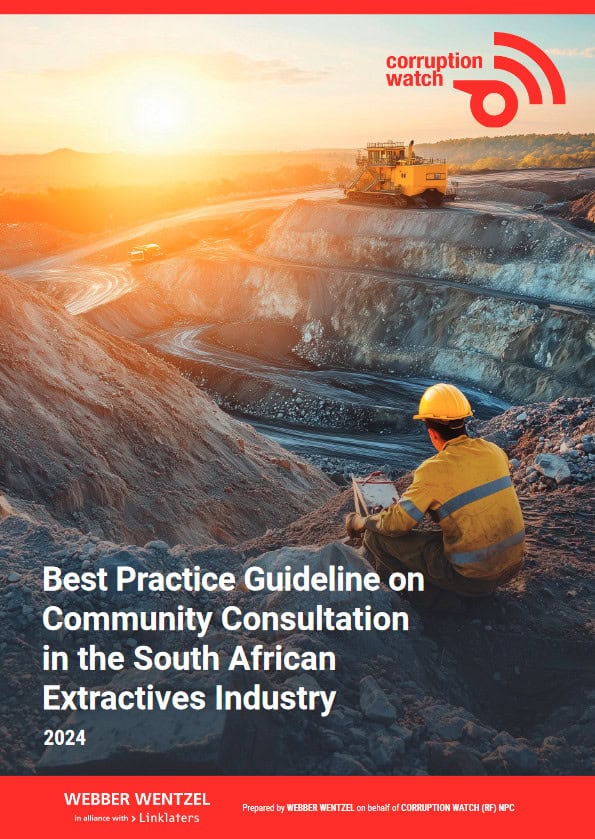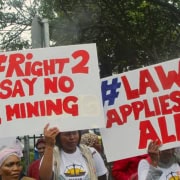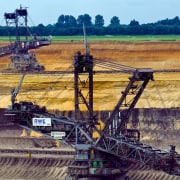|
Getting your Trinity Audio player ready...
|
Corruption Watch (CW) today launches the Best Practice Guideline on Community Consultation in the South African Extractives Industry 2024 (BPG), as part of the EU-funded Rallying Efforts to Accelerate Progress in Africa Project. The guide was developed in partnership with Webber Wentzel.
Many communities in South Africa remain disadvantaged and marginalised, a legacy of South Africa’s history of colonialism and apartheid characterised by systematic land dispossession, inequality, and racial discrimination, and the entrenchment of insecure customary land tenure for customary right holders.
“Despite the positive contribution of the mining sector to the country’s economy, consultations between mining companies and mining-affected communities have not always been optimal or effective, and are inconsistent,” says Sienne Molepo, CW’s BPG project lead. “These consultations are essential for establishing meaningful outcomes for mining-affected communities, securing the mining company’s social licence to operate, and ensuring that appropriate safeguards are put in place to conduct mining activities in a responsible manner.”
Considering the context and challenges underpinning consultation practices in the South African extractives sector, the BPG seeks to give guidance on community consultation requirements which must and should apply to mining projects, with reference to laws, policies, and international best practice.
It provides an analysis of the South African legal regimes applicable to community consultation and consent; how these are read and applied together in the context of mining projects; and their application to the nuanced community structures existing in South Africa. It also proposes recommendations to bolster or supplement the existing regimes to support meaningful engagement with mining-affected communities.
The BPG is intended for use by mining companies operating in the extractives industry in South Africa, the Department of Minerals and Petroleum Resources, and South African law- and policy-makers. It also has benefit for and can be used by mining-affected communities as interested and affected parties (IAP) groupings, as well as industry bodies and civil society, in providing practical guidance on consultation and consent in mining projects.
Community complexity
One of the key challenges faced by mining companies in determining the appropriate structures for engagement is the complexity of defining communities in South Africa. Mining-affected communities are not homogenous and communities are often comprised of diverse groups of individuals. Each community may have varying needs, and within communities there may be various groups with differing demands, at times competing or conflicting. Furthermore, the types of tenure and rights of communities and people forming part of communities may be layered and complex. This needs to be considered when seeking to engage in meaningful consultation.
The BPG outlines current legal frameworks governing or prescribing community participation, consultation, and/or consent requirements for mining development projects. Key legislation includes the Mineral and Petroleum Resources Development Act and the Interim Protection of Informal Land Rights Act. The applicable legal provisions are complex and layered, and in the context of community consultation in the mining sector, must be read and applied together. Their application should align with the Constitution’s Bill of Rights, which enshrines the rights of all people in our country and affirms the democratic values of human dignity, equality and freedom.
Meaningful consultation is more than a tick box exercise and should be a genuine, bona fide, substantive, two-way process aimed at possible consensus, while the medium used to publish the consultation notices and the language used should be appropriate to the IAPs to be consulted.
International best practice
The BPG reviews international best practice standards for South Africa to consider, pointing to several voluntary best practice frameworks and standards developed by the UN and other international industry bodies to guide business conduct in the extractives sector.
Each of these frameworks considers the critical role of local and indigenous communities as stakeholders and rights holders in mining development, and the need for effective and meaningful engagement with them. These instruments distinguish between indigenous and non-indigenous communities, recognising that free, prior and informed consent is limited to contexts where the rights of indigenous peoples may be impacted. They can guide meaningful engagement and consensus-building efforts with all mining-affected communities.
The complex legal framework regulating consultation with mining-affected communities requires meaningful engagement of varying levels and at various stages throughout the project lifecycle. A further challenge is that the legislation relating to informal tenure, communal land, and traditional leadership is in a state of flux.
“There is an opportunity for law- and policy-makers already applying their minds to revisit certain legislation to consider drafting a policy document clarifying how the various pieces of legislation should be read and applied together in the mining context,” concludes Molepo. “Of particular importance is clarity about how mining companies should consult more meaningfully with communities and indigenous peoples with a view to reaching consensus.”
For media enquiries contact:
Oteng Makgotlwe
Cell: 076 473 8336 E-mail: OtengM@corruptionwatch.org.za









